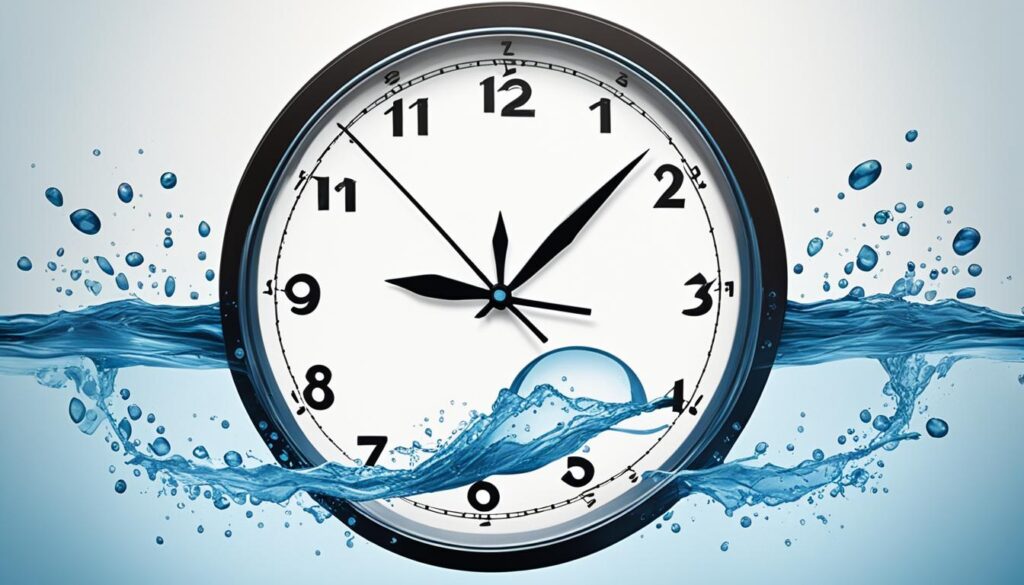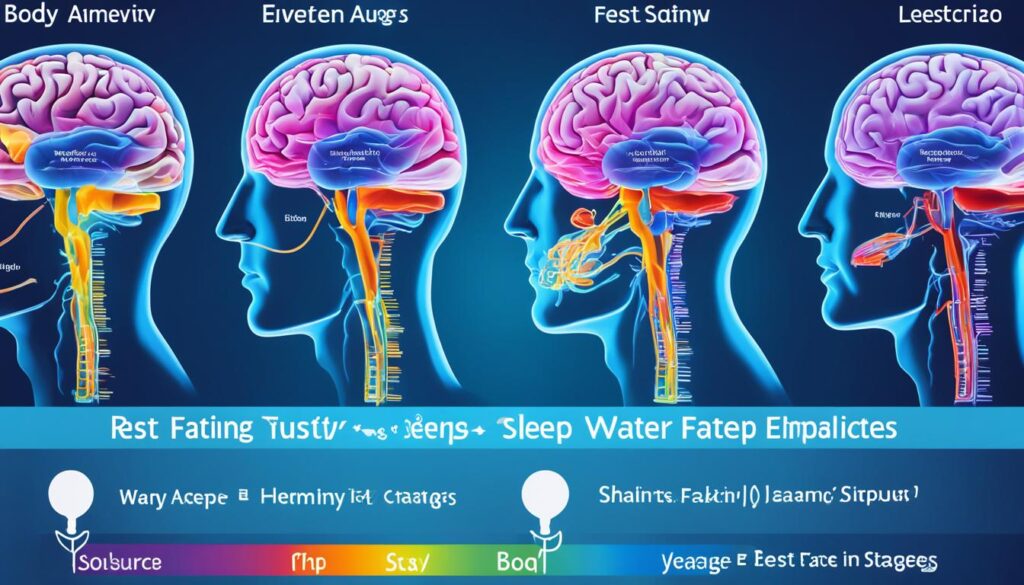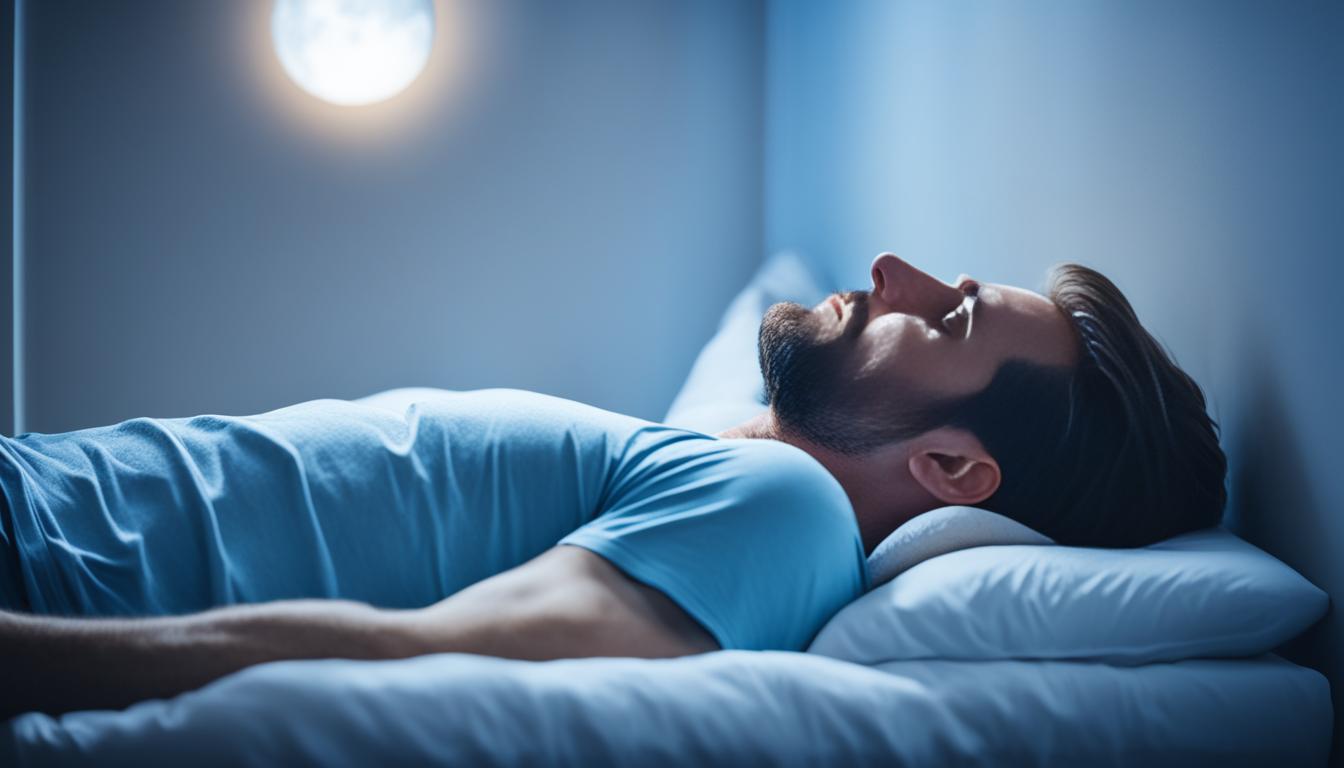The intertwining of water fasting and sleep patterns has garnered significant attention in health circles, sparking curiosity among those seeking holistic well-being. Observations from leading sleep expert Matthew Walker, Ph.D., shine a light on the nuances of how water fasting affects sleep. His findings, rooted in substantial research and empirical data, reveal that while individuals may confront initial hurdles with slumber during an extended fast, the sleep they do achieve is often profoundly beneficial.
Sleep patterns are undeniably altered during periods of water fasting, reflecting a biological response deeply embedded in our evolutionary survival mechanisms. As fasters navigate through the complexities of abstinence from food, their experiences cast invaluable insights into the intricate interplay between dietary habits and nocturnal rest. Dr. Walker’s expertise elucidates the phenomenon where reduced sleep duration does not necessarily equate to diminished restfulness, signaling an intricate balance the body maintains amidst food deprivation.
Key Takeaways
- Water fasting may lead to difficulties in falling and staying asleep, particularly during initial stages.
- Orexin release during fasting contributes to a state of wakefulness, possibly an evolutionary adaption for increased food foraging opportunities.
- Despite a reduction in sleep duration, many fasters report an improved quality of sleep with enhanced metrics such as heart rate variability.
- Research by Dr. Matthew Walker offers valuable insights into the relationship between fasting, orexin production, and sleep regulation.
- Understanding the sleep changes that occur during water fasting can facilitate a more effective and beneficial fasting experience.
The Connection Between Water Fasting and Sleep Patterns
The practice of water fasting has become increasingly popular as a means to detoxify and improve overall health. Often, individuals seeking to boost their well-being consider the importance of sleep during water fasting critical. Intriguingly, while water fasting is associated with various physiological benefits, it also brings about noticeable changes in sleep patterns. Experts and anecdotal reports alike note that, although the quantity of sleep may decrease, the quality, paradoxically, often improves.
At the center of this phenomenon is the hypothalamus, a small yet pivotal brain region that regulates numerous functions, including sleep and energy balance. During periods of fasting, the hypothalamus senses changes in the body’s energy status and reacts by instructing specific neurons to release orexin, a neurochemical that promotes wakefulness. This interplay suggests that the adaptations in sleep quality are a natural response to food deprivation, a mechanism deeply rooted in human evolution aimed at extending periods of alertness, potentially to increase the chances of finding food.
Understanding these shifts in water fasting sleep patterns is crucial, as sleep is vital to many aspects of our health, ranging from cognitive function to emotional stability. As individuals navigate the complexities of fasting, they are often in search of strategies for improving sleep with water fasting. While the full complexity of the relationship between fasting and sleep is still being unraveled by researchers, current insights suggest that the temporary compromise in sleep duration may lead to unexpected benefits in sleep efficiency and restoration.
The adjustments in sleep architecture during fasting periods reflect a fascinating adaptation of the human body, potentially affording a more concentrated, restorative slumber within a shorter time frame—a phenomenon that underscores the remarkable resilience and flexibility of our biological systems.
In conclusion, the dialogue between water fasting and sleep patterns is nuanced and indicates a deeply intertwined relationship that promotes survival and maintenance of optimal health under conditions of food scarcity. By gaining a deeper understanding of this connection, fasters can more effectively harness the benefits of both water fasting and sound sleep, contributing to an enhanced state of well-being.
Initial Challenges in Sleep Experienced During Water Fasting
Embarking on a journey of water fasting often brings with it not just the promise of health benefits but also the challenge of sleep disruption, especially in the early stages. Many enthusiastic fasters find themselves wrestling with bouts of wakefulness, and difficulties both falling and remaining asleep. This common occurrence has been the subject of much intrigue and study within the scientific community. Dr. Matthew Walker, an esteemed neuroscience and sleep expert, provides in-depth analysis into the benefits of water fasting alongside the initial adversities it presents to nightly rest.
While the fruition of such fasting and sleep disruption is multifaceted, the complex release and regulation of specific hormones during fasting play a pivotal role. Observations have shown that the body’s response to the lack of food intake can trigger a unique chain reaction affecting sleep architecture.
Understanding the Sleep Disruption in Early Stages of Fasting
The first few days of water fasting are often marked by a shift in sleep behavior, marked by an inconsistent sleep schedule and a latent sense of restlessness. Incrementally, as the body adapts to the new regimen, these initial hurdles start to wane, paving the way to more restful nights. Still, it is the early-stage fasting-induced insomnia that typically raises concern among fasters, urging them to look for coping mechanisms and better understand this temporal consequence.
Roles of Hunger Signaling Hormones on Sleep
Leptin and ghrelin are hunger-signaling hormones that serve as regulators for the orexin cells nestled within the hypothalamus. As one embarks on water fasting, the regulation of these hormones shifts, subsequently impacting the release of orexin and its consequential effect on sleep patterns. The hypothalamus, sensitive to the body’s energy levels, triggers the release of orexin to induce a state of alertness and wakefulness — presumably an evolutionary trait designed to enhance food-seeking behavior during periods of scarcity. Such biological adaptations, while essential in ancestral times, manifest today as fasting and sleep disruption, albeit temporary and with potential upside.
| Impact | Hormone Involved | Effect on Sleep During Fasting | Potential Benefit |
|---|---|---|---|
| Increased Wakefulness | Orexin | Difficulty falling/staying asleep | Heightened alertness |
| Regulation Disruption | Leptin & Ghrelin | Altered sleep patterns | Enhanced sleep quality (post-adaptation) |
| Thermoregulation | Hypothalamic Response | Lower body temperature at rest | Increased sleep efficiency |
| Heart Rate Variability | Autonomic Nervous System | Improved restorative metrics | Better stress resilience |
In summary, while the benefits of water fasting are well-documented, it is important for participants to anticipate and understand the initial sleep challenges that may accompany their fasting journey. Through a compassionate lens, Dr. Walker and other experts encourage a balanced perspective—viewing these disruptions as a transient recalibration of the body’s natural rhythms and an opportunity for improved health outcomes in the long-term.
Maximizing Sleep Quality During Water Fasting
Individuals embarking on water fasting often encounter changes in their sleep patterns. Experts emphasize the importance of maximizing sleep quality during water fasting as an integral part of reaping the full benefits of such dietary abstinence. Adhering to these tips for better sleep during water fasting may not only offset initial disturbances but also enhance overall physiological and mental health. Notably, specific strategies can be implemented to support greater restfulness and sleep efficiency.
Research has revealed that fasting can lead to improvements in sleep by reducing arousals and periodic leg movements, with a concurrent non-significant increase in REM sleep. It is suggested that such modifications in sleep are harmoniously aligned with the body’s circadian rhythms, fostering vigilance during the day and a more concentrated rest at night. Fasters can take actionable steps to ensure they maintain not only a fasting regimen conducive to improved sleep but also a favorable environment that promotes serene slumber.
- Regulate Light Exposure: Limiting exposure to blue light from screens before bedtime can support the body’s natural production of melatonin, a critical hormone for sleep regulation.
- Create a Sleep-Conducive Environment: Maintaining a bedroom that is cool, dark, and quiet sets the stage for a restful night, encouraging deeper sleep states.
- Mind Your Eating Hours: Strategic timing of your last caloric intake well before your usual bedtime can help synchronize with your circadian rhythm and improve your sleep onset.
- Consider Supplementing with Magnesium: Magnesium can play a role in supporting restful sleep, and levels may decrease during fasting.
- Engage in Mindful Relaxation: Practices such as meditation or gentle yoga before bed can help mitigate the increased alertness induced by fasting.
- Avoid Caffeine: Steering clear of caffeine within six hours before sleep can prevent disruptions in the sleep cycle.
- Stay Hydrated: Proper hydration is essential, but limit fluids close to bedtime to avoid nocturnal awakenings for bathroom visits.
- Be Consistent: Adhering to a regular sleep schedule reinforces the body’s sleep-wake cycle, providing more structured and quality sleep.
| Strategy | Purpose | Outcome |
|---|---|---|
| Controlled Light Exposure | Facilitate Melatonin Production | Improved Sleep Onset and Quality |
| Optimized Bedroom Environment | Promote Deep Sleep Conditions | Enhanced Deep and REM Sleep |
| Timely Nutrient Intake | Align With Circadian Rhythms | Reduced Sleep Interruptions |
| Magnesium Supplementation | Counter Decreased Levels During Fasting | Better Sleep Efficiency |
| Relaxation Techniques | Lower Fasting-Induced Alertness | Earlier Sleep Onset |
By adopting these maximizing sleep quality during water fasting strategies, individuals can significantly curtail the initial challenges posed by fasting and secure the much-coveted restorative sleep. It becomes clear that with careful planning and mindful practice, achieving better sleep during fasting periods is not only possible but can also pave the way for an enriched fasting experience.
Insights from Neuroscience: How Water Fasting Influences Sleep
As we delve into the benefits of water fasting, neuroscience has illuminated the manner in which fasting intricately affects sleep. The interplay between fasting and sleep is not merely coincidental but is governed by complex biochemical signals in the brain that respond to our energy intake.

The Role of Orexin in Sleep and Fasting
The neurochemical orexin, associated with arousal, serves as a pivotal piece in understanding sleep during periods of water fasting. Its levels rise during fasting, which may bolster the brain’s alertness. For humans, this could be traced back to evolutionary survival needs, where staying awake longer might have been crucial in the quest for food. This adaptation signifies one of the benefits of water fasting, revealing our bodies’ inherent ability to optimize arousal and wakefulness in times of scarcity.
How Circadian Rhythm Adjusts to Energy Intake
The circadian rhythm, our body’s internal clock, remarkably adapts to the energy intake fluctuations experienced during fasting. This master clock regulates the release of hormones like orexin within a 24-hour cycle, linking the rhythm of fasting to potential changes in sleep patterns. Researchers observe that this adjustment is key to managing energy efficiency, showcasing the dynamic nature of the body’s circadian rhythm during the practice of water fasting.
| Component | Function | Impact on Sleep During Fasting | Significance |
|---|---|---|---|
| Orexin | Arousal and Wakefulness | Increased alertness, reduced need for extended sleep | Helps the body adapt to energy scarcity |
| Circadian Rhythm | Regulates 24-hour cycle | Adjusts hormone release linked to sleep | Aligns sleep patterns with fasting state |
| Energy Intake | Fueling body functions | Reduction leads to alteration in sleep mechanics | Reflects the body’s ability to conserve and optimize energy usage |
Benefits of Water Fasting: Impact on Sleep Metrics
The quest for holistic well-being often leads individuals to explore various health trends, with water fasting emerging as a popular method attributed to numerous health benefits. Intriguingly, one of the less highlighted but significant water fasting benefits pertains to its impact on sleep metrics. Research and personal anecdotes present a compelling case for those looking to enhance their sleep quality.
Water fasting’s efficacy in improving sleep with water fasting has been substantiated through a range of sleep metric improvements. This encompasses a notable increase in heart rate variability (HRV), a measure reflecting the body’s ability to adapt to stress, and a decrease in resting heart rate, indicating relaxation and reduced stress levels.
Furthermore, a decrease in body temperature during sleep, commonly reported among fasting individuals, correlates with the body’s natural initiation of sleep onset. Combined, these metrics suggest that water fasting can foster a deeper state of restorative sleep.
| Metric | Impact of Water Fasting | Description |
|---|---|---|
| Heart Rate Variability | Increased by 25-50% | An indicator of the nervous system’s resilience and stress adaptability. |
| Resting Heart Rate | Decrease | Reflects a relaxed state, potentially leading to better sleep quality. |
| Body Temperature | Decrease | Lower body temperature is associated with rapid sleep onset. |
Subjective accounts from individuals who have partaken in water fasting regimes report fewer instances of sleep disruptions, substantiated by reductions in leg movements during sleep periods—potentially a manifestation of enhanced neurological calmness. Consequently, these experiences translate into a self-perceived elevation in sleep quality, an outcome eagerly sought by many in society’s quest for improved well-being.
Even as our understanding of the intricate relationship between diet and sleep deepens, water fasting stands out as a promising avenue for those keen on enhancing their sleep architecture through natural interventions.
These findings coalesce into a narrative that not only highlights the sleep metric improvements associated with water fasting but also underscores the viability of such practices in contributing to overall health enhancement. As the body adapts to the fasting state, it seems to engage mechanisms that promote more efficient sleep, perhaps a primal response to conditions of food scarcity.
Ultimately, the benefits of water fasting on sleep metrics offer an additional layer to the existing framework of health advantages associated with this practice. Embracing a fasting regimen might not only pave the way for weight management and detoxification but also unlock the door to enhanced nocturnal recovery and revitalization.
Exploring the Changes in Sleep Stages During Water Fasting
Water fasting, a period during which one abstains from all food and drinks nothing but water, has been observed to lead to various alterations in sleep stages. These changes, particularly within the realm of water fasting sleep stages, offer a glimpse into the body’s innate capacity to adapt and optimize for energy conservation and revitalization.

Deep Sleep and REM Cycle Modifications with Fasting
Fasting initiates a fascinating physiological transformation during the nocturnal hours, most notably affecting the deep sleep phase, also known as non-rapid eye movement (NREM) sleep, and the rapid eye movement (REM) stage. Preliminary observations suggest that while water fasting, one may see an incline in deep sleep’s reparative functions. On the backdrop of fasting, the body appears to heighten the deep sleep benefits, potentially due to the increased need of the body to restore and repair itself during these hours.
Improvements in Sleep Quality Post Fast
Following a fasting period, many report not just a quantitative change in their slumber but a qualitative leap. Individuals often denote a noticeable enhancement in REM sleep improvements following days of water fasting. These testimonies align with empirical findings that indicate a non-significant rise in REM sleep duration, alongside a subjective experience of rejuvenation and elevated mental alertness upon awakening.
| Sleep Stage | Modifications During Fasting | Reported Benefits |
|---|---|---|
| Deep Sleep (NREM) | Potential increase in duration and restorative function | Enhanced physical recovery and cellular repair |
| REM Sleep | Non-significant increase; improved quality | Boosted cognitive function and emotional balance |
The convergence of these modified sleep stages and the benefits of water fasting suggest that the adaptive modifications in sleep architecture play a pivotal role in how the body manages and optimizes its energy resources during a fast. Together, the deep sleep and REM cycle modifications witnessed offer a window into the body’s remarkable ability to fine-tune its sleep patterns under decreased caloric intake, capitalizing on the healing encounter that is sleep.
Physical and Psychological Benefits of Altered Sleep During Fasting
The intertwining relationship between fasting and sleep has revealed a constellation of physical and psychological benefits that are vital for holistic health. Notable shifts in sleep pattern alterations during fasting have piqued interest for their impact on both the body and mind. While some may perceive these changes as inconveniences, they herald augmented measures of health benefits of fasting that transcend mere weight loss or detoxification.
Among the myriad advantages, fasting individuals often report an unmistakable surge in daytime alertness, along with significant mood enhancement and a fortified sense of emotional well-being. These subjective experiences, testimony to the inextricable link between diet and cognition, strengthen the case for fasting as a means to refine not just the body but also the psyche.
- Increased daytime alertness
- Improved mood
- Better emotional well-being
- Heightened sleep quality
Clinically, alterations in sleep patterns during fasting periods suggest a dip in sleep arousals and a decrease in movement disturbances—markers of deeper, more restorative sleep. Such enhancements in sleep architecture are crucial for sustaining both physical health and daytime functioning. This strategic conservation of energy and expedited recovery underscores fasting’s role in optimizing human health.
| Altered Sleep Effect | Physical Benefit | Psychological Benefit |
|---|---|---|
| Increase in Sleep Quality | Better rest and recovery | Reduced stress and anxiety |
| Increased Heart Rate Variability | Improved autonomic balance | Enhancement of cognitive functions |
| Decrease in Sleep Arousals | More restful sleep | Less nighttime restlessness |
| Reduced Movement Disturbances | Physical relaxation | Emotional stabilization |
In essence, the practice of fasting, by fostering physical and psychological improvements, impacts not only the dietary aspects of health but also the intricacies of sleep—a facet of well-being perhaps as crucial as nutrition itself. Reflecting on these benefits, fasting emerges as a compelling ally in the pursuit of enhanced sleep quality and overall mood, illuminating the interdependent pathways leading to an enriched, balanced life.
Strategies for Improving Sleep with Water Fasting
Embarking on a water fasting journey can not only detoxify the body but also significantly alter sleep patterns. For those looking to enhance their nightly rest while engaging in this practice, certain environmental adaptations and lifestyle choices can make a profound difference. Herein lie the strategies for improving sleep with water fasting, lending themselves to the twin goals of health improvement and well-being maximization.
Adapting Your Environment for Better Sleep During Fasting
Creating a sanctuary for sleep can have a substantial impact on the quality of rest received during a water fast. Crafting an optimal environment for sleep starts with an adherence to darkness, which prompts the body’s natural sleep signals. A cool and quiet bedroom, free from disruptions and noise, ushers in an ambience conducive to rejuvenative sleep. Curtailing the use of electronics well before bedtime is pivotal in minimizing blue light exposure, which can interfere with melatonin production, crucial for regulating sleep cycles.
Moreover, creating a rhythm to your bedtime and wake-up times anchors the body’s internal clock. This consistency is key in achieving sleep that is not merely sufficient in duration but rich in quality.
Lifestyle Tips for Enhanced Sleep While Water Fasting
Dietary and lifestyle choices can be subtly nuanced yet significantly impact sleep during water fasting. Indulging in exercises during the day promotes physical fatigue by evening, priming the body for rest. Contrariwise, the evening should be a time of winding down, where serene and soothing activities guide the body towards a state of relaxation.
Caffeine and alcohol are adversaries of sound sleep; thus, their avoidance or reduction is paramount in guaranteeing uninterrupted slumber. Fasting can lead to waking due to a drop in blood sugar levels; hence, maintaining hydration throughout the day until the early evening ensures the body remains balanced without necessitating late-night bathroom trips.
Should you encounter restless nights, instituting a power nap during the day may serve as a means of reprieve, bolstering alertness and mitigating the effects of sleep deprivation. Yet, these naps should be confined to the early afternoon and kept brief to prevent interference with nocturnal sleep patterns.
Bearing these strategies in mind—the environmental and lifestyle enhancements—fasters are well-equipped to navigate the challenges that water fasting may present to sleep. Through thoughtfully aligning one’s fasting journey with practices that favor restful nights, optimizing sleep quality and achieving a harmonious fast become attainable goals.
Conclusion
The exploration of water fasting and sleep provides a compelling glimpse into the potential sleep pattern benefits attainable through this ancient practice. As we’ve uncovered, the journey into water fasting might be punctuated by initial sleep disturbances. Yet, these are typically overshadowed by the body’s remarkable ability to adapt, often leading to notable improvements in sleep metrics and overall holistic health. Neuroscience paves the way for an enhanced understanding of this process, underscoring the role of orexin in arousal and the circadian rhythm in regulating our sleep-wake cycle during fasting.
Adopting strategies for improving sleep with water fasting is not just a means to mitigate the initial challenges; it’s a step towards augmenting one’s well-being. The body’s response to this form of dietary restriction – from the sharpening effect on mental clarity to the enhanced efficiency of sleep – speaks to the intrinsic connection between fasting, rest, and overall well-being. It’s a harmonization of the body’s natural rhythms with the conscious practice of abstention, culminating in an enriching, balanced state of health that resonates with our deepest physiological and psychological needs.
In conclusion, recognizing and leveraging the synergistic relationship between water fasting and sleep can be a profound avenue to bolster not just one’s physical health but also mental and emotional states. For those seeking to refine their lifestyle and elevate their condition, the interplay between these two elements offers a pathway to achieve that goal. Whether through a brief period of water fasting or more prolonged regimens, the benefits emerging from the nexus of fasting and sleep continue to provide a fertile ground for discovery and personal growth.




